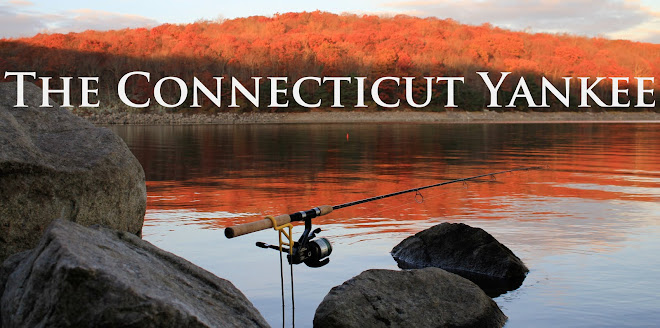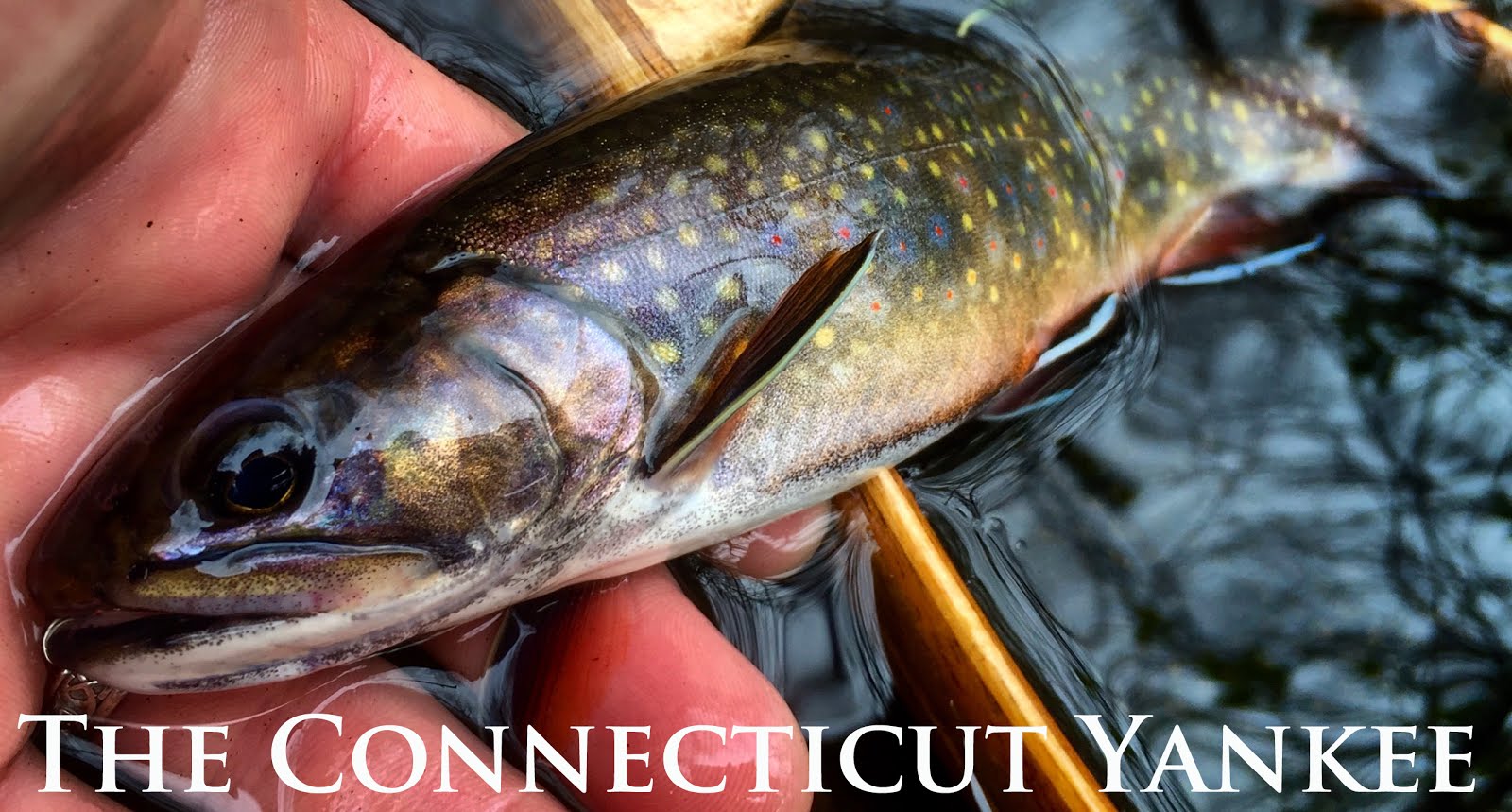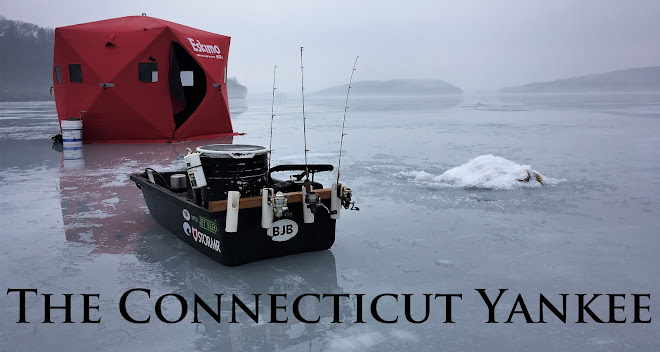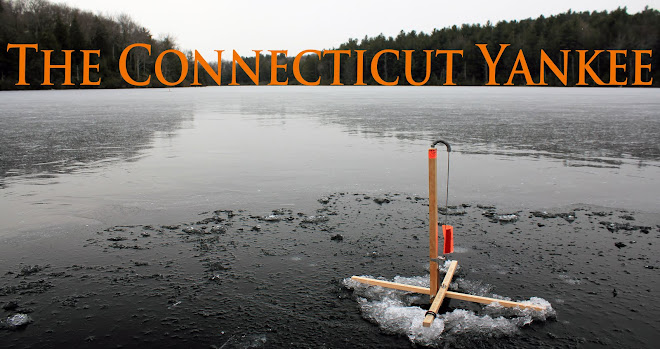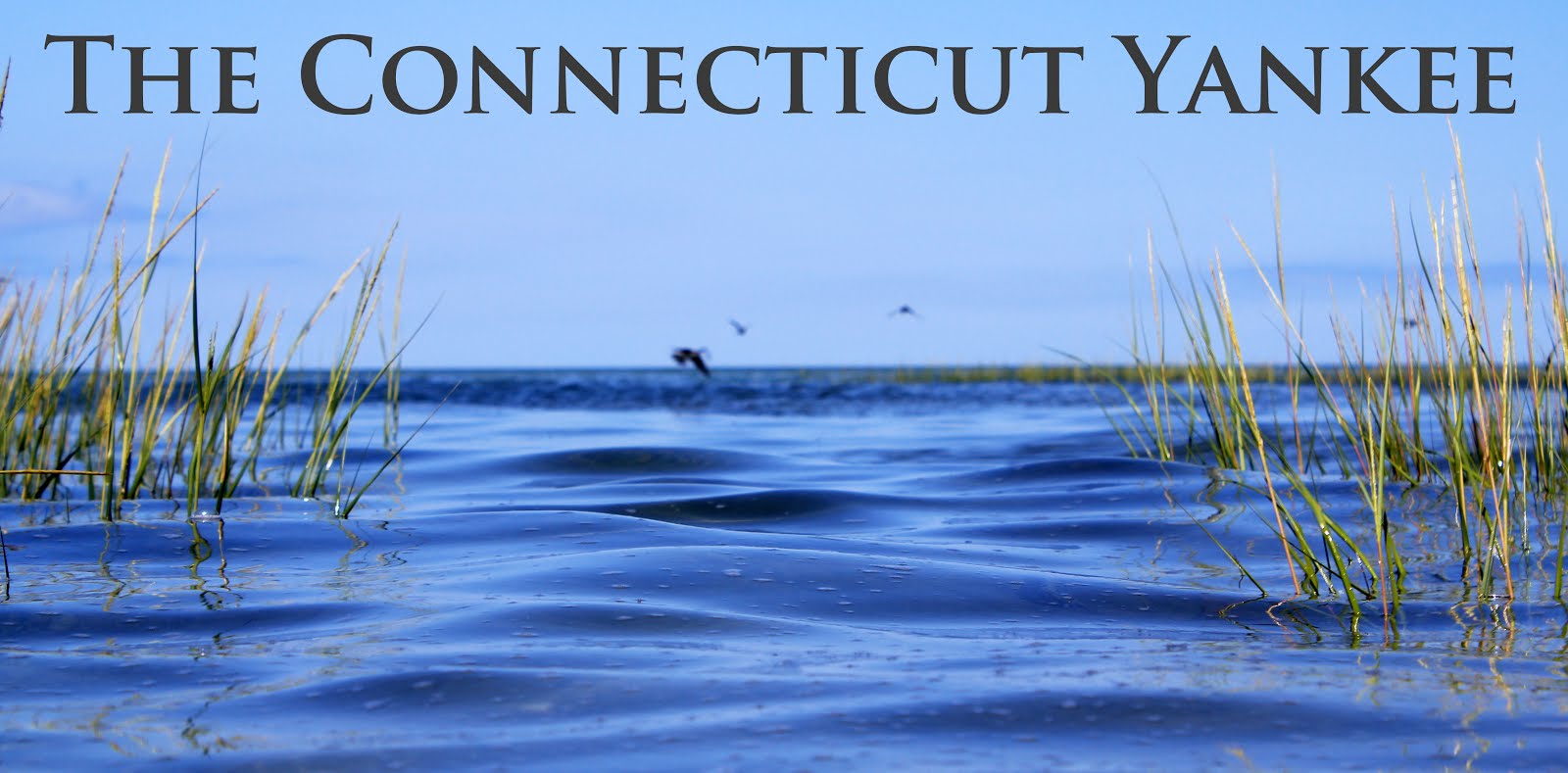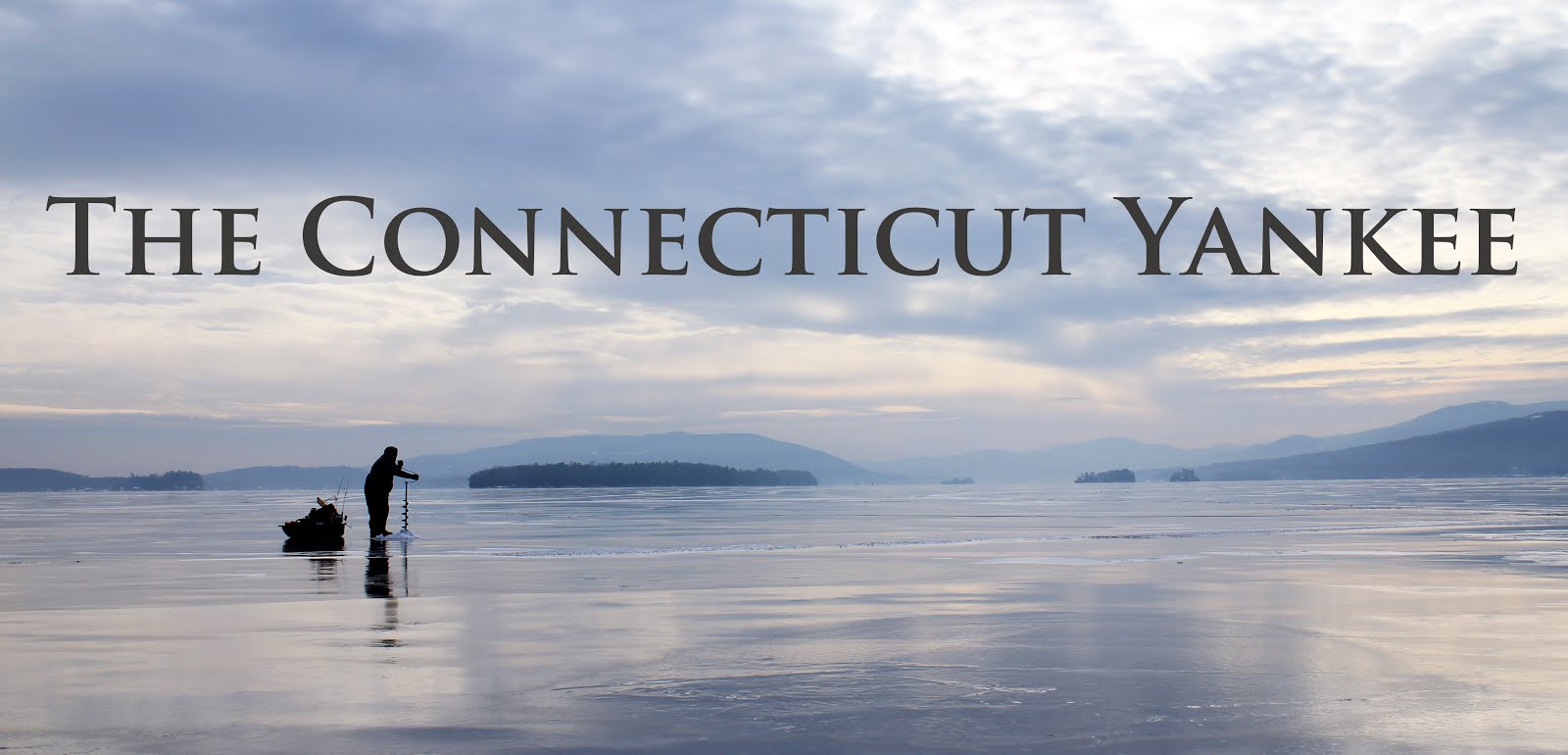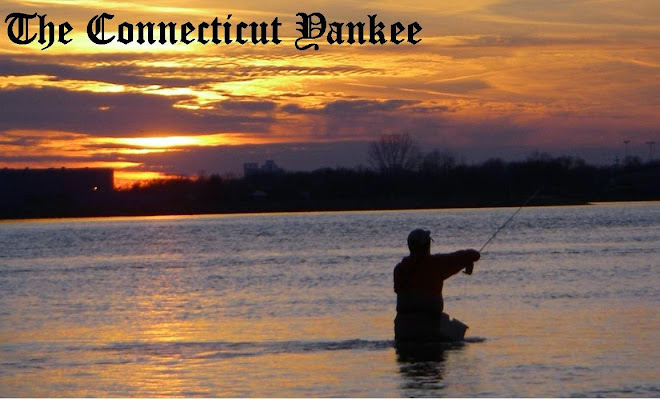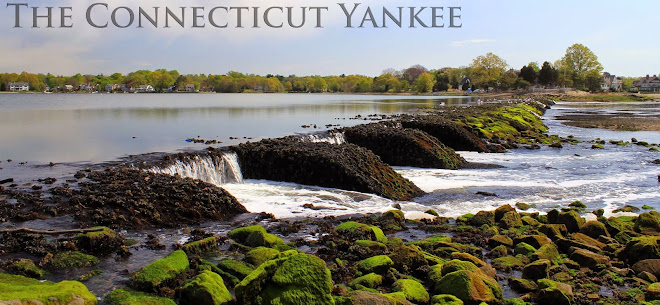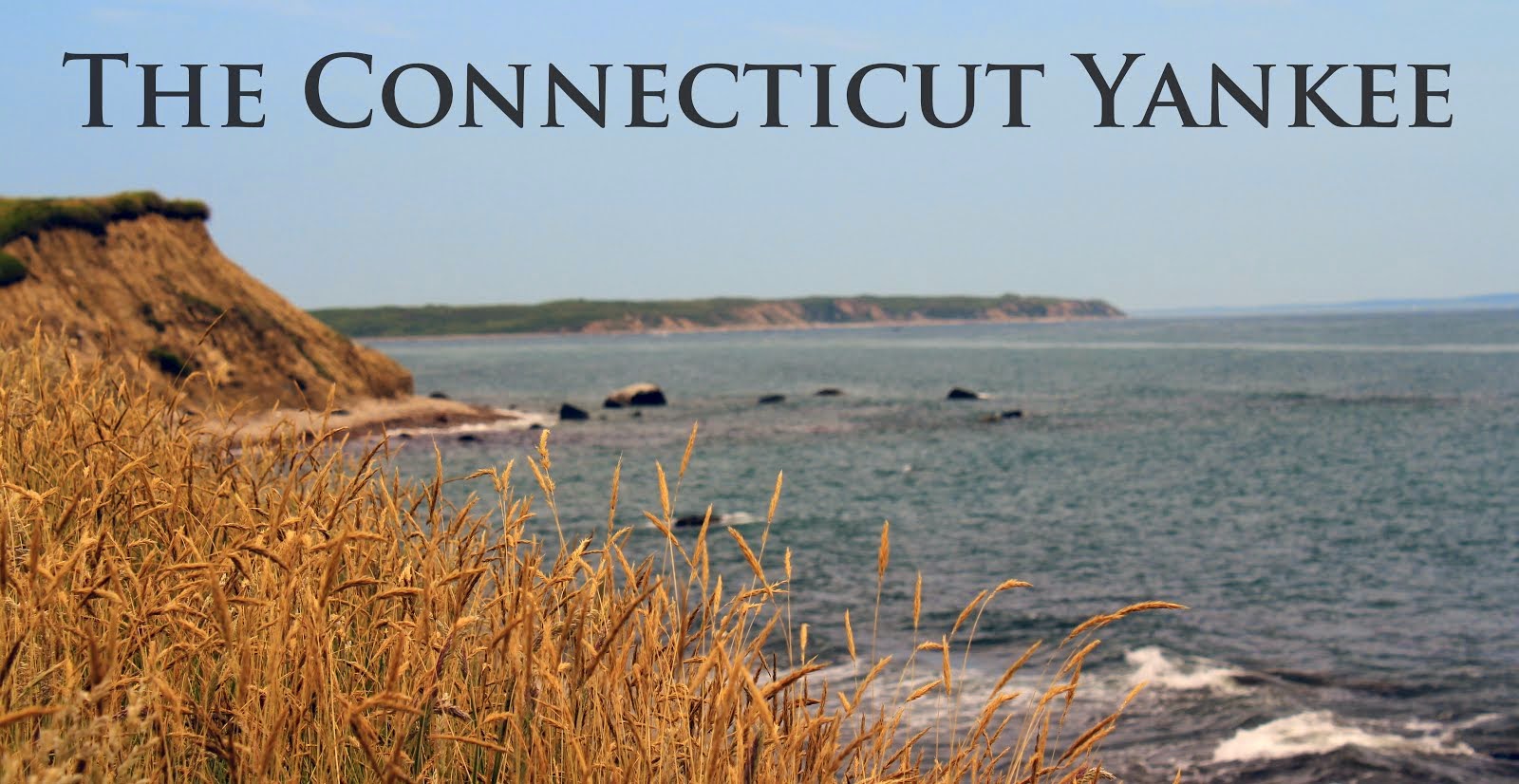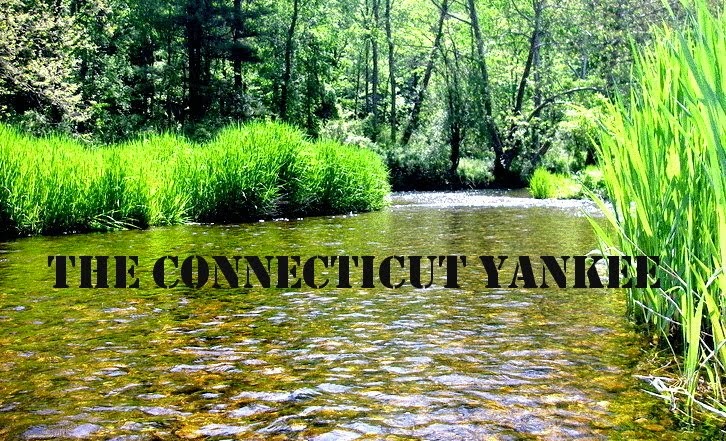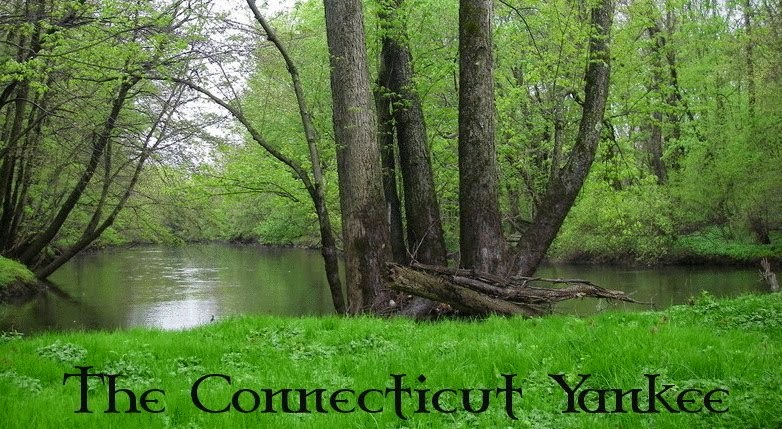Sunday, November 6, 2022
The Fall Classic
Thursday, September 1, 2022
Traditions Never Die
Though several months removed, the trip is still seared in memory and the smell of wood smoke clings to my gear. While a recap from our annual Opening Day celebration is long overdue, sifting through photos from that weekend brought me right back and had me itching for more.
Traditions never die, but they do evolve. Our trip is a hell of a lot less about fishing now than when it started decades ago. It's pretty evident that we spend way more time swapping stories and eating good food around the fire than we do making drifts for trout. I'm not bothered by that. I still love fly fishing and the Farmington River, but when the third weekend of April rolls around, and I get a little time off from work and dad duties, I'm taking it slow and soaking it all in.
This evolution doesn't change the fact that, come hell or high water, we'll be back celebrating each spring for as long as we're physically able to. It's my favorite weekend of the year by far and something I look forward to introducing my own kids to when the time is right. If they love it half as much as we do, the future of this tradition is bright.
Wednesday, July 6, 2022
Better Late Than Never
It's a good thing that Rob never gave up on asking me. For years, I had to respectfully decline each of his invitations to target smallmouth bass on the Housatonic River. Not because that type of fishing didn't interest me—smallies are among my favorite species to fish for—more so because life, work and a host of other reasons got in the way.
This spring was different. When Rob's annual invite came via text, flush with recent photos of him and his sons holding top-notch specimens, for once nothing prevented me from accepting the kind offer. I was in the midst of a job change with a week off in between. River flows were good. Weather looked mint. My time had come.
I don't live far from where the Housatonic pours into Long Island Sound. About 50 miles northwest of there, just a stone's throw from the Appalachian Trail, is where I met Rob on a late May morning. It was a gorgeous section of river, a mix of pools and boulder-strewn pocket water, too warm for most trout and just right for crayfish-eating smallmouth. And that's what we used on the end of our lines. Not the actual crustaceans, but flies and soft-plastics that closely resembled them.
Rob played guide the whole trip like he'd been getting paid to do it his entire life. We walked along a trail next to the river, over a mile upstream from the parking area and through some of the most beautiful country that Connecticut has to offer. The plan was to fish our way back to the vehicles and when we finally stopped walking and waded into the water, Rob gave specific instructions that I followed to a T. The first pool he put me on, and just about every riffle and run after that, produced fish.
The stretch of river Rob brought me to was riddled with smallies. With a halfway decent cast and presentation, our baits were getting crushed without hesitation. The fights that followed were fun, too, peppered with jumps and summersaults. It was a good workout for my old Orvis T3 six-weight and Rob's seasoned Fenwick. Aside from the hot bite and incredible scenery, one of the best parts of the day was not seeing another soul. Not one other angler upstream or downstream for miles. On a Friday no less. I'm not complaining, just a little surprised after all the trout fishing I have done on pressured waters.
Hats off to Rob for sharing his time and knowledge with me and providing such an awesome experience. Countless trips on that river since his childhood have prepared him well for the task. My respect and admiration for the smallmouth bass, as well as the mighty Housatonic, has only grown since. It was a special outing many years in the making and very much worth the wait. As they say, better late than never...
P.S. This was the first non-ice fishing trip with my new GoPro. Having some fun getting back into filming and editing. Hopefully the videos keep getting better over time...
Friday, June 3, 2022
the wisdom and faith of a child
Editor's note: Chad Wilde is a gifted writer and good friend. This story, a fine tale about his son's first encounter with a northern pike, is the last installment in a series of guest posts...for a little while at least. All of Chad's work is worth reading, but anything on getting the next generation more passionate about the Great Outdoors sits particular well with me. Enjoy...
Sometimes, though it may work against your conventional knowledge, it is wise to listen to the ideas of a child when fishing. Children come from fresh places. Their experiences are always building. They pay attention to what works and seek to replicate it, as they pay attention to what doesn’t and seek to eliminate it.
For my son, River, he always has ideas about what fishing lures, techniques, and methods should work. And I gently try to impart him with what knowledge I’ve picked up through four decades of angling while also giving him the leeway to try out his own ideas. On a blustery cold November day when fishing for pickerel, if he wants to throw an eight-inch top-water snake lure, by all means have at it buddy. But after a while I’ll say, “Maybe we should try subtle little jerk baits?”
Sometimes, it is a hard stop no. Like, a spinner bait just won’t work dangled below that giant bobber. Even if we do tip it with a live nightcrawler and add several pieces of split shot for some unknown reason. But I try to listen, and in his learning, I learn as well.
Everyone who knows me as an angler should know that my favorite type of fishing is predator fishing. Give me Esox whenever available. Pickerel, northern pike, muskellunge. These are the fish that have my whole heart.
I’ve instilled this in my son. River will gladly and readily fish for anything that swims, god bless him, but given the choice of venue he’ll usually ask me to take him to The Pickerel Palace. This is a small, weedy pond near us here in Willington that is infested with pickerel.
“Esox, they’re like dinosaurs, Dad,” he tells me. I agree. And who doesn’t love dinosaurs?
When tasked with doing a class presentation project on a wild animal, River naturally chose the pickerel. He studied them, he wrote up a report about them, and we printed a number of pictures to use as visual aids. When it was time, he dressed up in his suit and tie and presented his findings to his class.
“Esox, they are dangerous fish”, he said. “Like dinosaurs! Look at their teeth!”
We both love the perceived violence of the Esox fish. We like their teeth, their aggression. We love the places they live, slow flowing rivers and warm water ponds. Their hiding places, deep weed beds, downed timber. They move in our minds like silent menaces, and when we find them while fishing we are one with that menace and we connect with something different inside ourselves.
All humans are animals, after all. And in Esox fishing, one can connect with the deep places where the luxury and softness of modern life is stripped away. We become the hunting predators we once all were. And in Esox fishing, the predator chases the predator and we’ll see who comes out on top.
Last Fall, when River was turning 10, I decided it was time to expand his predator fishing and get him off The Pickerel Palace and on some better waters. Waters where I hoped to help put him on his first northern pike. To this effect, I reached out to my friend Steve Pogodzienski.
Steve is a pike guide and friend who has taught me more than anyone else about fishing for predators. It was time for me to call in the big guns and get River in touch with a fish that would gladly eat a Pickerel. But first, Steve and I had to talk strategy.
It had been a remarkably wet summer and the river we planned to fish had been on a rollercoaster. Huge storms regularly dropping inches of rain that made flows impossible to fish for long periods of time. Impossible to fish, and for fish to even eat.
This worked for us in a sense. We would have to watch the flows as summer gave way to fall. And we would have to find a relatively dry period where the river would drop to an acceptable level for a float. Steve told me that when a window opens up and the flow is right, those fish will eat. I believed him fully.
I knew River would relish the chance to go fishing with Dad and Steve on a serious trip, and I wanted to make sure he had a shot at catching a fish. We timed it perfectly, and we hit the water in early October during a window that was wide open. At the launch, my son was a ball of excited energy. He was ready to go. He had so many ideas about what would work, and he brought a number of his own personal lures to use.
He was excited that I got to use my fly rod. When we fish, generally I do more guiding and less fishing, as it should be. And he notices this. A wise friend had once told me you could be a dissatisfied angler or a satisfied guide depending on how you approached fishing with your child. I chose wisely there, but today I wouldn’t need to guide since we had Steve.
Our plan was to get on the board with some bass fishing. River is a very good bass angler, and I wanted to make sure he connected with at least one fish on the day. I told Steve as much. He decided to work us up into a backwater cove off the main river that Steve knew held bass. Before we entered he told me, “Throw your fly up in the mouth there. Pike will post up just outside these coves sometimes.”
I did. And a solid pike literally left the water trying to eat my fly. I was a bit rusty, I panicked and trout-set. The line was limp. We all knew then, as the water’s surface calmed from the eruption and I cursed at myself inside, that the window was indeed wide open. A good sign. No more than 20 minutes into our trip and I had an aggressive take.
The cove itself was one of those deeply weeded places you just know hold warm water fish. We discussed lures to use, and River had a series of suggestions. Steve settled on a pink Slug-Go for River’s spinning rod. I sat back and watched my boy get into the fishing, and he fished well. The benefit of the pink Slug-Go was that we could all clearly see its darting glides through the cove.
It was impossible to think the bait wouldn’t get River an eat. Before long, I heard his small boy voice say, “Got 'em!” He was on his first fish of the day.
He proceeded to pick a number of bass out of the cove as well as a giant crappie, and he was thrilled to do so. As he released a particularly chunky largemouth he said, “Don’t go get eaten by a pike!” He knows the food chain, and he knows who sits at the top. I was proud of him. With the skunk off, it was time to go look for pike.
I have to say, I rebounded nicely from the early miss. I took a deep fish. I had counted down the fly until it disappeared below the dark water, carried by a full sink line. Once it felt down enough, I began to work it. A ghostly strike. There is a point in a deep retrieve with a pike fly where the whole thing suddenly gets a bit weird.
You can’t feel anything, no slack, no fly, no line. The rod just feels weird, fully empty. What has happened here is that a pike has inhaled the fly. Some unseen transaction has occurred and the lack of any feeling means the fish has eaten and moved towards you with the fly hopefully still in its mouth. This is when you quicken the strips until your mind’s eye tells you, “Now. Strip set!”
This doesn’t always work out, but it did this time and the strip set placed the iron in the jaw. After a brief fight, we had our first pike of the day. It was a great moment to share with River, and Steve. River had never seen a northern pike first-hand. This clearly fired him up and I could tell he wanted one of his own.
Shortly after, I got another eat. This one on top, like the first that I had missed. The fish materialized only one strip off the bank, below some overhanging tree limbs, and swirled the fly. I waited, nicely, and set hard. We had a second pike. As we admired and released the fish, River suggested maybe he should try a different lure.
He had won a swimbait in a charity raffle. I don’t know a damn thing about swimbaits, but I asked around. It was a 3:16 bait and apparently retailed for $150. This perfect bait for pike fishing he refused to cast, due to the potential financial impact of losing it. “What about jerk baits?,” he said. “ Maybe they’d eat a perch looking lure, Dad?”
We considered this but collectively decided that the Slug-Go would be the best bet. A properly tied pike fly with a Buford-style head behaves just like a Slug-Go. That side-to-side sway, so sexy in the water. Steve and I felt it best to keep the soft-plastic on, for now. The window was open, and we were scoring fish with my presentation on the fly rod. The Slug-Go acted like the flies I was using so we stuck with it. We fished on.
It got slow, and I could tell River was tired. We had woken and left early, and through the afternoon we had fished hard. He sat for a while, quiet, had a snack. Did some more fishing, reeled behind his back for shits and giggles, bombed casts, kept fishing. But the early luck had run dry.
I was fishing the B sides of the water, when I was fishing at all, gladly giving River the preferred lies. I really enjoy just watching him fish, and I wanted him to get a pike. I already had a pair.
As his energy level dropped even lower, we anchored up on a long slow bend in the current with a dying weed bed on the inside edge. “Ok, little buddy,” I said. “Let’s make it happen.”.
After hours with the pink Slug-Go, he was determined to try a new approach. He rummaged in his backpack for a lure that had come in his Mystery Tackle Box that month. He held up a two-inch rubber paddle tail grub in a sunfish pattern.
“This is the one,” he said.
“Are you sure, buddy?,” I answered. “That one?” I sort of looked at Steve side-eyed here. It was just a little thing, definitely a decent little bass bait, but Steve could tell how bad I wanted him to get a pike and this selection didn’t seem to fit the bill. I pulled back, and placed trust.
“Ok, if you say so,” I relented in a sigh. It wouldn’t work, I thought, but he had faith. Steve tied the tiny lure on to a length of bite tippet.
Now at this weed bed, he insisted I fish as well. No more sitting around, Daddy. We’re on a fishing trip! So, both of us went to work on the weed bed.
I knew there was a fish there, and I felt pretty certain I was going to get it since he was forcing me to fish and I felt pretty confident in my presentation by this point. These pike, I knew they were eating. River pitched the weighted bait into the weeds. I started to work slightly downstream of them.
On a pike float, when it comes, it just mesmerizes the whole boat. And suddenly, it came. River made his usual utterance, “Got ‘em.” I turned to watch, was this a snag?
I saw motion in the weed bed, something was there. He had a decent amount of line out, and the bend in the rod told me this was a decent fish. I thought it was a good bass. But then I saw it flash in the water as it ran, free of the weeds. No, this was a pike. It got serious, real quick.
He fought that fish well, gave it no chance really, and licked it quick. He did well, and we all began screaming when the pike was netted. “What’d you catch!?, I yelled.”
“LET’S GO!,” he screamed back. “I caught a ginormous pike on a lure that my Dad didn’t think would work!”
They know, they always know. What we show them we must show wisely as they are always seeing and always learning. We must trust them to follow but walk on their own two feet. We must tread carefully as they will certainly follow. When we’re too tired, they’ll carry us as we would them. But it is best that we walk together. We must trust them and trust ourselves to teach well and learn hand in hand.
River’s fish was bigger than either of the two I had caught. A proud moment for me, watching Steve hand him the fish. He knew how to slide his hand below its gill to grip the bony structure there. He supported it and grinned for the photos. Steve held the fish up current and we all watched it regain its strength.
We grew quiet. He called it a dinosaur. The beautiful fish steadied itself. “I told you that that was a good idea,” he whispered.
“You know, I’m not gonna lie…,” I couldn’t finish as I broke out laughing.
Steve said through his own laughter, “I know. I know. I saw you watching him.”
We retired the lure, and now it was his turn to sit back and watch me. He had an unforgettable look on his face. Now, not to toot my own horn, but with the monkey off his back I felt free to get as many more as I could. The window was clearly still open. So I did, and ended the day with four pike, but who's counting really? River didn’t get another one on the pink Slug-Go, but we surely weren’t fishing the two-inch paddle tail. That lure is up on his bookshelf right now.
As we drove home, he fell soundly asleep in the seat beside me. The cool fall air outside, the warmth of the car’s heater within, a belly full of fast food. Maybe he dreamed of dinosaurs? When I finally slept, I didn’t dream of nothing but the wisdom and faith of a child.
Thursday, May 26, 2022
ocular violence
Editor's Note: Chad Wilde is a gifted writer and good friend. From time to time, I am fortunate to showcase his work here on The Connecticut Yankee. This is the second of a three-story series. Thanks for taking time to read it.
At the theater, there is a marked feeling of anticipation. Gatherings, and rustling. Meeting one another, before the show, below the marquee with the light above glowing down to announce the attraction. For us, the theater is the boat launch on the Housatonic River, and soon we’ll be seated for the show. A pike float.
There, among our stretched lives, are moments that bond relationships. These moments, our classics, are forged from our shared passions and our enactment of them together. Our summa’s and alphas. Our omegas. And when the codas of our lives swim into focus and the sounds of the world hush to everything, we are left with nothing else to hear.
We find our places, as Pogo engages the jet and the boat departs upriver from which we will begin the float. We enter and take our places in the house. And at the theater, we speak to one another.
The early part of the drift is the gathering, the excitement and anticipation. Discussions of the players in these events to come, the sheer drama of them. We catch up, we don’t see each other often, and our chatter is warm. We are excited.
Me and Aaron, we aren’t exactly slouches, we’re not great either, but we pass the mustard, so Pogo has little actual guiding to do save the navigation of the boat. This is finding your seat; and preparing for the performance to come there in the theater of our minds. Getting comfortable.
As the drift progresses, there comes less conversation, more anticipation, a heightened focus since it is going to happen. A nice quiet, not uncomfortable. And in the draining of sounds there, we kick back and luxuriate. The only sound left, the subtle stroke of the oars through the water. Here, we get ready for the show, we begin fishing with concentration.
And afterwards we maybe look to each-other, those who attended the same events, those in the know who have heard the same sounds, seen the same sights, and we may say: Did you see that? Our classics.
We collectively lower voices, our breaths bated, as the lights flicker on and off. And then the lights go down gently as the curtain waves from some bustling behind. And there, in the calm quiet of it all, the curtains finally open and all murmurs hush. The music begins.
And the setting is the very end of the Berkshires, the rolling green hills, the deep bends in the river as it cuts through southern New England. The laydowns, old deadwood, the edges of weed beds, the slow motion of the current. The clay banks, where small birds nest and flitter from, off across the fields below the hills. It is a lovely stage, well set.
Punching the pike fly up tight, a good cast. Soft advice; rod tip in the water, from the director. The tan fly sinks into the flow through a slow three-count and the show truly now begins. The fly quarters out on the first strip, teases and curtsies. The curtain, it begins to draw apart.
Three strips in and 18-inches deep the articulated fly takes a perceptible alteration of path following downstream just where the drop off falls to channel, it is still visible. And it kicks as the strip is ready to pull again on my fingers, and the curtain is fully open.
The fly speaks its preamble. I am femme-fatale, I am deathly pale in the tannic water. I am the damsel, dancing. I am distress. Drunk athletic and loose of limb. I am the dying baitfish, it says. Come take me.
A classic. One you can talk about years later. The performance, itself. Heading into a show, you know the players. You know whose presence and action on the stage will set the memory. And you wait for the climactic moment, the chaos of reveal. The moment the antihero appears guns blazing and the fight kicks in. John Fucking Wick and Jesse Fucking James. Perfect choreographing of the dance. The fly; retrieved and briefly figure-eighted below the gunwales.
Plots, they never thin. They only thicken. And the more often the fly pulls from the water, into the back cast, and then shot out to the bank to repeat its shifting flow into the retrieve, the more this plot does thicken. Each new spot we pull up on, this is the scene for the climax. This is the place.
The silence of the theater. The hiss of the fly line, rhythmic through two back casts, and then the longer, sibilate sound of it shooting through the guides and perfectly tucked tight to the target, here an upstream blowdown. All gnarled tree limbs and crags disappearing below the bourbon-colored water. A perfect spot. A perfect cast.
The director, from the rower’s seat, speaks quietly, saying, Nice. The highest of compliments. And the dance begins.
Come take me, I am failing here, I am swimming but I tire. See how I palpitate and quiver. I turn tenderly, expose myself to you that follows: the antihero hidden. The following star. The fly is irresistible. And it is now time. That which we have come to see enters the stage.
A Northern Pike in perfect profile arching and engulfing the fly from behind, just as you prepped to take the next strip of the line, and when you are in best contact with the fly. And you watch the moment of grace. The ocular violence occurs before your widening eyes. The show has begun. The flash of its movement, when all that it is, its purpose revealed, is just mouth and teeth and eat. That hit is like a drug, and addicts find addicts. Imperceptibly, we all see the show go down. We share.
Something has happened. There it is.
This pike has taken the fly with an incredible urgency, and once taken it seems to pause in the mind’s eye. It does pause there, ponderously. All the world gone but this and you saw it all with your own two eyes. Internally, a gasp choked back as you prepare for the drama.
The fish turns, it moves back upriver to the blowdown from which we are drifting. And your strip set hits perfect, this time, and the line goes ever so tight. The rod tip leaves the water arching and bending to the opposing weight. There it is, you say aloud, a rapt audience. The fight is on.
Then, the head shakes. It makes desperate runs. It is a brawling fight. A remarkably long minute, if that. It’s longer if you get a hot one. You do what you can to land the fish. It is apex hunting. Big game hunting. It doesn’t always work out. There are sad classics after all. The drama, the plot, is thick.
Every predator fish risen, is a great thing and to land them is electric. And in that electricity, you can meld yourself to other people privy to the same surging current.
The space between happy classic and sad classic is razor thin. For all of us. You are looking for it, that connection with a predator. You all are. You want the ocular violence so badly and you are so grateful when it comes. This can weld steel between us, either way.
It doesn’t happen every time, a great show. But the activity of taking in the culture more than makes up for viewing a so-so production. But not this time, this one is a classic.
Pogo has the net ready as the fish boils the surface and makes a run below the boat. Leaning into its performance, you give but make the fish earn it. Its tail sweeping it away below the visibility line. Then, back to view, and spent. On its side slightly, but always, you know, it is gathering its strength to run again. The show has to end. The net slides under and once contained, the fish kicks violently against its hold, all gnashing and swirling. But beaten there.
At those climax moments, when we sit on the edge of the seat and wait for the resolution, we are all indebted emotionally in this show. Invested. Years later, in our easy chairs, together we clink our glasses and toast to the true classics, we lean in towards each other and ask, “Do you remember that?”
Another show has run the course. The boat’s comfortable silence is replaced by our applause and adulation for the performance. With plyers, removing the hook from the corner jaw. Holding it, the memory, in a standing acclimation as the flashbulb pops and it is preserved for memorialization.
The hero bows. Placated, and spent. You hold its tail with a hand below to support its belly. You hold it upstream until the languid sweep and kick of the fish tells it is strong enough to be taken away from you, for now. And it slowly moves off from your hands, it dreamily disappears. Back stage again, heading right back to the blowdown from whence it came. And you swish your hands in the cool brown water.
Standing back up, in ovation, grinning, asking:
Did you see that? At the curtains close.
Tuesday, April 26, 2022
other people’s fish – jim lawless
Editor’s Note: Chad Wilde is a gifted writer
and good friend. This story, about his late Uncle Jim, is the first in a new series
that Chad is sharing on The Connecticut Yankee. It's a great piece that hits home
for me and may for you, too. Many thanks for reading.
Most days spent fishing can be swept into an amalgam of memory. Yes, we go fishing and we either catch fish or we don’t. These are all good days. But other days are different and leave different wakes behind them.
Some days, something remarkable happens. And when the experience moves higher from commonplace we are left with ringing stories to recall many years later. They can leave behind something funny, poignant, or powerful. These are the stories you want to hear told when close by a campfire.
For me, I can’t get enough of these tales. I willingly share mine. But more than sharing, I like to hear others recall their own great fish stories. I’m good at prodding them forth. I enjoy saying things like, ”Hey, tell them about that time”…….and then watching eyes light up slightly as someone has just had their stage set perfectly for them to tell a good story.
People enjoy telling about their great memories.
I’ve heard some of the stories told by my Uncle and friend, Jim Lawless many times. I loved to hear him tell me about several of great fish he had found himself associated with through his long life of outdoor pursuits.
We would, perhaps, be at our annual Fishcamp and he would
have a Busch beer in one hand and a White Owl cigar in the other. Below his push-broom moustache a smile would
creep and I would sit back and listen to a story I had heard before but wanted
all the same to hear again.
My Uncle Jim was a self-depreciating angler, and among our group he was known either as “Fishless Jim” or “Camp Squaw.” The former sobriquet given for obvious reasons, the later truly an expression of appreciation since he always took good care to ensure our camp was well fed and as comfortable as the weather would allow.
As an angler, Jim was a bonified worm dunker, passionate ice fisher, and horrible fly fisher. But he wasn’t really always fishless.
In thinking of him, I recall words written by Thomas McGuane about his own father:
“Uncle Ben, was my father a good fisherman?”
He Smiled and said, “No, Tommy, he was not. But no one loved it more.”
And this sentiment accurately applies to Jim. In his life, he took such pleasure from the streams and still waters of Eastern Connecticut and beyond. He was in his element waded thigh deep in the Natchaug or Farmington rivers casting for trout, on the ice of West Hill Pond checking a flag (most likely empty if it was his flag), or in the Adirondack Mountains with his brother Ted fishing remote ponds for native Brook Trout.
Here are several of his finer stories.
the snob
As mentioned, Jim was a horrible fly fisher. We both took up fly fishing fairly late in
life. While my own fly fishing improved
over time, Jim never truly caught on to it.
He would tell me how proud he was of me in my progress. We both found the medium more art than
leisure and though he never truly got it as a fly fisherman he did own a fly
rod and a small box of flies, which he would occasionally put to use. He would mix in a bit of fly fishing with his
preferred method of dunking worms, but rarely found success.
He never fully committed to fly fishing, since he was more comfortable with a spinning rod. “I never catch anything on my fly rod,” he said to me.
“Jim,” I replied, “you never catch anything on your spinning rod either.”
He laughed, “Well, this is not true. I mostly don’t catch anything on my spinning rod. Not never.”
One day his work brought him to a meeting near the Farmington
River. Jim decided that he would bring
only his fly rod, to remove the temptation of using his more familiar spinning
gear, and after the meeting ended he would go fish the Farmington. He arrived in the afternoon at Peoples State
Forest, rigged up his fly rod and tied on a dry fly which he schmeared with
flotation gunk, donned his waders, and marched into the water.
In his words, his casting sucked. He didn’t know a damn thing about mending line, and his drifts were useless. All the same, he was out there and he was fly fishing. As his fruitless efforts naturally returned no results another angler arrived, we’ll call him New Guy.
This angler was a sharpie according to Jim, or at least Jim thought he was. This guy had all the fancy gear, you could tell. He looked exactly the part of a Farmington River fly angler.
Jim grew a bit self-conscious. He could feel New Guy watching him. Finally, he turned around. New Guy asked him if he minded that he fished just above where Jim was flogging the water. Jim, being a solid fellow said of course not.
Now what Jim didn’t realize is that New Guy had just ‘high holed’ him. He pulled a fast one and committed a breach of angling etiquette. This subtle move is certainly frowned upon by those of us who regularly fly fish, those of us who are not horrible fly fishers.
New Guy was essentially cutting in line, something that even second graders know is inappropriate. The underlying wisdom here is that when fly fishing one generally works from down river upwards since all trout position themselves facing up current. Essentially, you are trying to creep up behind them. New Guy had just deprived Jim of potentially doing so.
Jim was glad to be left alone and he continued his usual anticipated
skunking in peace. He glanced upriver
several times at New Guy. When he did,
he noticed that he was constantly changing flies. Jim chortled to himself, thinking, You can’t
catch a fish without your fly in the water.
What Jim didn’t know here is that New Guy was likely attempting to ‘match the hatch’, and more directly mimic the insect activity that was taking place. Farmington River trout can be pretentious in what they are eating, difficult to catch. New Guy was making sophisticated alterations to his pattern, perhaps downsizing from a 22 to a 24.
With all of his amendments to presentation, New Guy’s luck was no better than Jim’s. It was shaping up to be one of those fishing trips that no one really remembers. But then, something changed.
As Jim casted his line and watched his admittedly shitty drift a trout rose and dimpled the surface and took his fly. Jim lifted the rod, and lo and behold, found himself tight to the fish. He must have made some commotion, as New Guy began wading down to him. As Jim netted his catch, he was amazed that it was a Tiger Trout and a fine one at that.
Together, the two anglers admired the fish, and then Jim released it. Naturally, New Guy asked what fly the fish took. Puzzled, Jim considered his response here.
He told me, “Chad, I really didn’t know what fly it
was. A Grey Ghost, or whatever. It was just what I had decided to tie on.”
Jim looked directly at the New Guy and said honestly, “Trout fly.”
In my personal opinion, a perfect response. We had a good laugh, Jim and I, the last time he told me this story. He said to me, “I must have sounded like such a snobby bastard.”
For the record, it was an Adams of an undetermined size. This unknown detail decided upon years later thanks to the fact that he compared it to flies found in the bins of a fly shop, and he had retired the fly that Tiger ate for posterity.
brad somehow caught it
Jim and his brother Ted were quite fond of the Adirondack Mountains and began in 1983 to take annual pilgrimages to the area on or about Memorial Day weekend to fish a series of remote Trout ponds in a wilderness area in the region. They had no clue at first what they were doing, but they had a map and a 1972 Dodge Tradesman van that had been converted into something of a make-shift camper van, they had a flat-bottomed boat, worms they’d dug up at home, and plenty of beer.
The wilderness area they arrived at was certainly not a luxury campground. At best, you were allotted a nasty outhouse and a beat-up old picnic table, but it was free camping so it fit the budget. Their early trips were largely unsuccessful, and it was a pain in the ass to drag the flat-bottomed boat to a featureless disc of water where they would troll worms behind wobblers and swill beer. But it was a trip these brothers took yearly, and gradually they found waters that produced fish.
And they would take these fish, Brook Trout with vibrant pink flesh, to eat. And they would fry them and serve them with baked beans and home fried potatoes. And they would share time together, and drink beer.
When a thunderstorm blew up one day, they were forced to retreat to shore, dock the boat, and seek shelter. They found enormous boulders uphill from the pond leaning together forming a sort of cave. It wasn’t much, but it allowed enough of a dry place to build a small fire and wait it out, while drinking more beer. Good times to be shared.
In later years, they began to invite others on their annual trip. And one year they invited some guy named Brad. The thing was, Brad wasn’t a great fisherman. And if Jim made this claim, which he did to me every time he told me this story, he must have truly been god awful. Since the flat-bottomed boat wasn’t large, they decided to leave Brad on shore while Jim and Ted took to their usual routine of rowing in turns and trolling whatever pond they had gone to this fateful day.
Brad wasn’t mad at them.
He took his low rent fishing pole, a six pack of beer, and a pack of
smokes and carefully proceeded to creep out onto a fallen tree that laid in the
water. Here, he sat down crossed legged
and began chain smoking, drinking beer, and doing what fishing he could while
Jim and Ted fished the pond proper from the boat.
After a while, Brad began screaming at the top of his lungs. Jim and Ted immediately rowed their boat to the log he was positioned on assuming he had impaled a finger on a hook or fallen victim to some other calamity. But no, Brad was hooked into an immense fish.
“Chad,” Jim told me, “I have no idea how he caught that fish. The log he was on had all sorts of limbs and shit in the water below. His pole was a K-Mart special and his line had to be years old. How that fish didn’t find one of those snags or otherwise break him off, I have no idea. But he landed it, without a net.”
“How big was it?” I ask, but I already know.
"A 29-inch Brown Trout," Jim said. "And to make it more complex, how the hell did a Brown Trout get into this remote Brookie pond anyhow? That thing must have eaten so many Brookies that we should have been eating!"
They had a camera with them, and I’ve seen with my own two eyes that gigantic Brown Trout. Brad’s finger stuck unceremoniously through the gills of the fish, holding it up like the trophy that it was. All the better dead, that fish. However the hell that massive Brown got into that pond didn’t matter anymore, it would eat no more native Brook Trout.
jim got a flag
Jim was an avid ice fisherman. Many times, I have enjoyed sharing the ice with him. While he rarely caught a fish, he made a mean breakfast sandwich. As “Camp Squaw,” Jim was always well organized and well prepared. He’d tell you that the key to a good Clam Chowder while ice fishing was to bring a couple extra cans of diced clams to add to the soup. He is dead on in this assessment.
In the 1970s, Jim’s father, his brother Ted, and Uncle Jerry
took up ice fishing. Naturally, Jim
joined them, interested in this new novelty that would force these men outdoors
in the harsh New England winter and jam them together in a homemade ice shanty.
The shanty was cobbled together from plywood and a series of hinges that allowed it to be folded for transportation and erected on the ice. It was heavy as hell, and rickety to boot. It didn’t do much to provide warmth but at the very least it broke the wind and gave some basic modicum of relief from the elements to allow for proper beer drinking. He would bring his dog, Sunset, an Irish Setter, and the poor dog would lay there shivering on the ice while all the flags stayed down and the men drank beer while waiting for them to go up.
Eventually, Jim obtained his own gear and the shanty fell
into utter disrepair and thus by the wayside.
He continued ice fishing and a favorite spot of his was West Hill
Pond. I went with him several times. On one occasion prior to the trip I recall
asking him how the fishing had been of late since I don’t regularly fish the
pond.
“Oh, very, very poor,” he told me.
To me, this was fine since I’d be going with my Uncle and friend and I was sure he’d be making something delicious to eat. We got skunked, the fishing was indeed very, very poor. But even the slow days were sweet. I only remember this day, because afterwards I stopped at a jewelry store and bought the ring that my wife now wears on her left hand.
But one day, Jim had different luck on West Hill. The fishing wasn’t very, very poor this day.
He was fishing with Ted and their friend Jack. Upon showing up in the morning, to his chagrin, he realized he had left his fishing license at home. Now Jim was an extremely ethical angler. He never took more than his limit, and he abided by most of the rules of the game. On this fateful day, he decided not to set his tip ups and risk a run in with a warden.
Really, an easy decision. Besides not having a copy of his fishing license, it didn’t really matter after all if he did set his tip ups since he wouldn’t catch anything anyway. Just less work to do in breaking down at the end of the day, he reasoned.
As the morning wore on, both Ted and Jack were having luck. Jim started to feel a bit left out, a bit antsy, so he struck an agreement with Jack. They would alternate flags. First, Jack would take a flag and then on the next one Jim would fish it. A fair and equitable solution, and only bending the rules really, no harm no foul since this day they were practicing catch and release.
As Jim’s turn in the rotation came, he and Jack made their way to the standing flag. Jack held Jim up, saying that he thought he was going to take this flag. He assured Jim that he would indeed let him field a flag, but just not this one. He could absolutely have the next one. Jim reluctantly agreed. Jack caught a shitty pickerel.
They sat back down and drank beer. After a while, Jack looked out across the ice and announced that a flag was up. The men walked to it, and this one was to be Jim’s turn since Jack had mucked up their rotation taking the last flag and earning himself a shitty pickerel. When they arrived at the flag, the spool was spinning quickly. Something had taken the bait. Jim pulled the trap from the ice, took up the line, and set the hook.
He knew instantly that this was no small fish. It felt solid and as it neared the hole in the ice, this assumption proved true. When he had landed it, it was the single biggest trout he had ever taken through the ice. A 19-inch male Brown Trout.
Jim had a moment of pause here.
The fellows had no camera to document the catch. Jim considered that he would take the fish and have it mounted. But this day, they were fishing catch and release and he just couldn’t kill such a magnificent animal.
Jim told me that in the glistening winter sunlight he had
never seen spots so radiant and lovely, mixed in with the black patterning of
the trout were crimson dots that looked to him as red as fresh blood. It had the sheen of a winter Brown to it,
silver on its shoulders and yellow bellied, its jaw slightly kyped. It was a true work of art as it slipped from
his hands and swam back into the depths of the pond.
All these years later, I just wished that Jim had decided otherwise and took what should have been Jack’s fish to be mounted. I’ve never seen that fish, but I feel I have from the sheer number of times I’ve asked Jim to recount the tale. In my mind’s eye, it is what it had been for Jim. The prettiest fish either of us had ever seen.
And while this is good and well, in my heart I’d love to have seen that fish on his wall where he could have pointed to it and said, I’ve got a story about that fish. Fishless Jim, he deserved that mount, but he just couldn’t have killed such a magnificent animal.
after all
My Uncle and friend Jim Lawless passed away last spring. He had been sick for a while with Pulmonary Fibrosis. He had survived a double lung transplant, but he was never the same after. He soldiered on through a variety of ailments after the transplant. He could no longer drink beer, and O’Douls just doesn’t taste the same. His kidneys failed eventually and his condition choked the enjoyment from his life. He tried as hard as he could, and at the last he just couldn’t drag his feet to slow the circle down.
The last time I saw him fish a river well, on his own two feet in waders, was in 2016 on the Natchaug River where we had met on a fine spring day. I saw him catch a number of Rainbow Trout on worms and an ultra-light spinning set up. I sat back that day on the shore and watched him in his element for a good long while. We had a long talk that day, and he wasn’t fishless.
At our annual Fishcamp last year, he was a shell of himself. He was always cold and he wasn’t as strong as he had been. He had no energy to fish, and I drove him down to the Natchaug River where he stayed in the car and watched the current for a while. A week or so later, he died peacefully at home surrounded by his daughters and wife.
At his funeral, the family had constructed a board with many photos of Jim through the years. As I looked at them, I realized how many of those photos I had taken myself, the fishing photos. I would print them for Jim, and I think he put them in his fishing photo album. I’m grateful I was there to take so many pictures with him, and I’m grateful for all the stories he and I traded.
Jim’s stories, they live on.
As does his memory. And I know
that this year at Fishcamp he’ll be telling them, and drinking beer, with my
own Dad. Out there on the other side of
the Natchaug River, at the campfire we all will someday share.






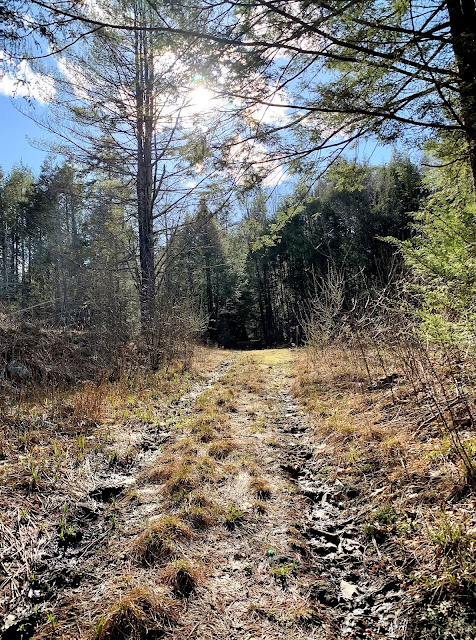















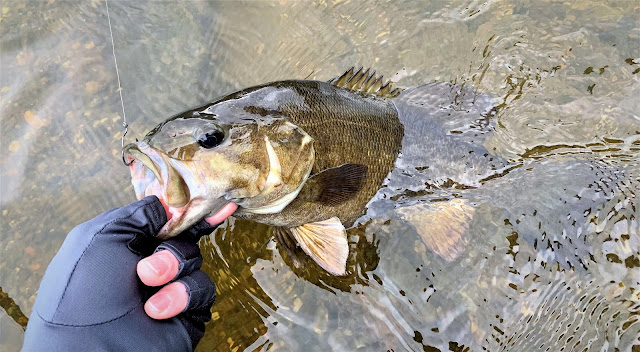







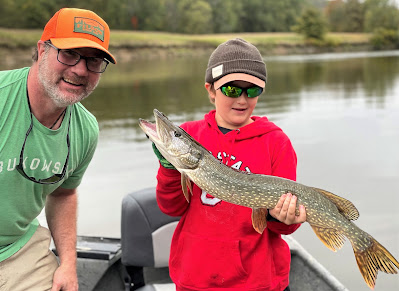



















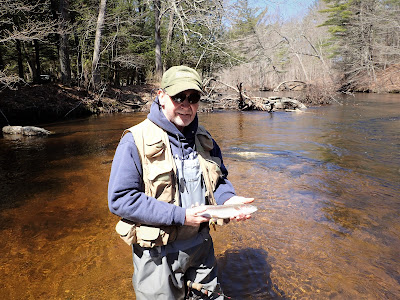


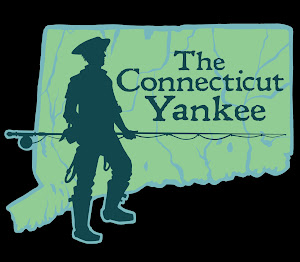









.jpg)

